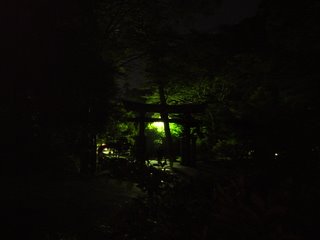Hotaru

Several of my more devoted readers (those of you who completely lack a life) have been publicly pondering what on earth a Hotaru is, so I shall enlighten you now: it is nothing on earth, but rather a tiny denizen of the faerie realm which deigns to visit Japan for two weeks of the year, choosing, I suppose, Japan's more remote and fertile forests as a fecund backdrop for its own annual mating rituals. When caught in the act this magical creature transforms into a little bug, which perches on one's hand and glows with a perfect and innocent light. In English Hotaru are called Fireflies, and when one sees them it becomes immediately obvious how superstitious people came to believe in fairies.
Japanese people love fireflies (for good reason, I say!) and my friend Mr. Hiroki is particularly fond of them, having not been able to see them in his native city of Nagoya. Every year many towns have a firefly festival (hotaru matsuri), in which they visit a remote and pure spot to witness the magical theatre which these gentle creatures provide. I could not wait for Tottori's festival and instead pressured Mr. Hiroki to take me to his favourite spot a week early. He agreed and three weekends ago Mr. Hiroki and his girlfriend Ms. Kaori took me to the temple where the Hotaru are best viewed. This temple is surprisingly close to the city, but like many temples in Japan it has a long rambling country walk behind its grounds. This walk leads along a deep, tree-lined cutting down which flows a strong and babbling brook. The walk crosses a bridge and leads up some stairs to a small lake surrounded by thick forest. There are no lamps or lanterns, and from the gate to the lake the only artificial light comes from the front of the temple. On the night of our visit the sky was clear and the moon full, so the whole scene was bathed in a gentle silver light, enough to find our way along the path but not to scare the Hotaru. The Hotaru themselves hung in a diffuse groups over the stream, drifting randomly about in slow circles and pulsing with a surprisingly bright luminescence. They looked for all the world like drifting embers or sparks, except that their movements were too directed to be mere Brownian motion. Occasionally one would detach itself from the thin cloud of sparks and drift across the path, and once or twice I was able to catch one on my hand, where it glowed brilliantly for a moment before launching itself back into the air. Fireflies are just insects, and as a consequence I think are better viewed from afar, but the glow is fascinating and in the darkness the sight of my friends' faces glowing in the light of a captured firefly was quite enchanting.
At the top of the hill the fireflies hung over the lake, and as they drifted their lights were reflected in the water, the moon being just bright enough to cast shadows. This was the point where the fireflies truly seeemed like fairies, dancing a slow and incomprehensible dance over the lake.
Many people had chosen the same evening to come and see the fireflies, and nany people were walking up and down the hill when we arrived. All were talking very quietly so as not to disturb the object of their journey, and when we reached the lake and sat down I noticed that all the benches around the lake were taken up with small groups of young people, who had come to the lake to watch fireflies and talk quietly. Something very interesting about Japan is that young people seem to be very interested in the festivals and rituals of Japanese life, even those which perhaps to the mind of the average westerner might seem a little stuffy or not particularly vogue. They seem to be particularly interested in festivals connected to animals and nature, and not just because (as in the case of the cherry-blossom festival) they include large amounts of drinking. I think young Japanese people are, by and large, hippies. They also perhaps show a greater cohesion with older generations than do young people in western countries. Why this should be I do not know.
While we sat by the lake I managed to converse with Ms. Kaori (who speaks almost no english) in Japanese, with occcasional help from Mr. Hiroki, and explain to her that in Australia we do not have nature festivals. Having that very week learnt how to compare two things in Japanese, I was able to give a rather simplistic comparison of environmental policy and attitudes in our two countries. Japanese people are universally shocked to discover that Australia's rivers are dying and that our only coherent environmental policy is rapid deforestation. Deforestation is tantamount to heresy in this, the most heavily forested developed nation in the world.
Having done these things, we left the fireflies to their slow and stately mating dance and returned to Mr. Hiroki's house, having completed a most satisfying and edifying Japanese ritual. My next ritual comes in September, when I go to listen to the voices of the suzumushi (singing insects), again, I hope, with Mr. Hiroki and Ms. Kaori.


3 Comments:
Golly! What a magical evening, very beautifully captured by your expert hand, Sir S.
Yes, very nice indeed. Some fuzzy underexposed pics would also have been nice.
Raa, raa, raa, more pics in general please, Sir S! And a cute little piccie for your profile too : )
Post a Comment
<< Home